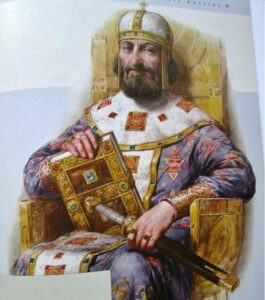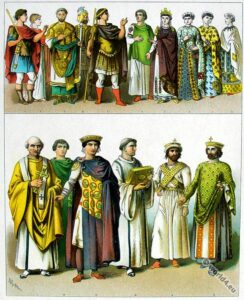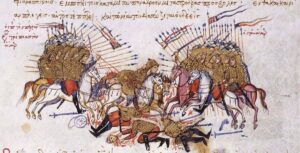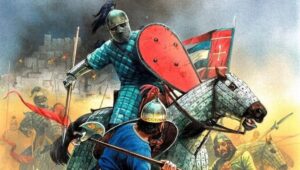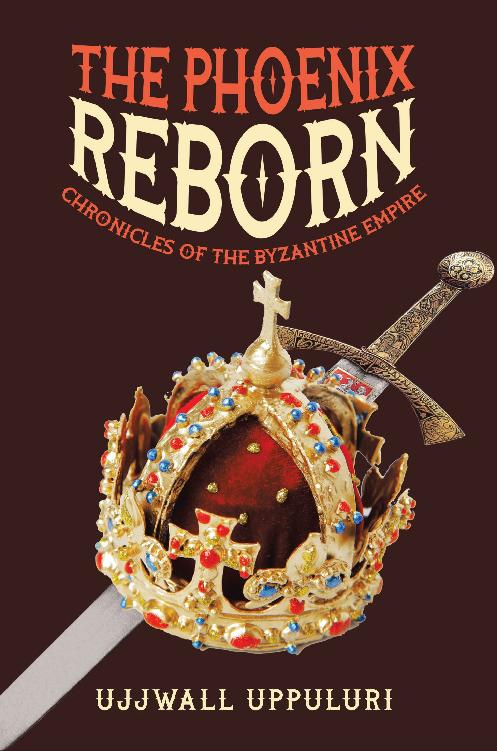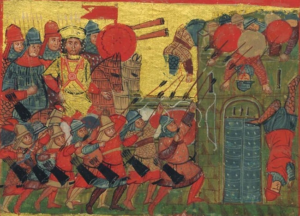Earlier in the week, we had the awesome privilege of looking at a great book by Ujjwall Uppuluri called Chronicles of the Byzantine Empire, The Phoenix Reborn. The author joins us for a special interview where we talk about his passions in economy, fantasy writings, and more. Read on to see what makes Uppuluri tick, and to find out more about the worlds he is building.
Tellest: Hi there Ujjwall. Thanks for taking the time to talk to me today. With your work as an economist and with your side-hustle as a historical fiction writer, I’m sure you’re keeping busy!
Ujjwall Uppuluri: Indeed I am. Thanks for asking.
T: One of the first things I like to learn about people is what started them off on their writing journey. You’re an international economist, but now you’re also writing these massive historical fictions on the side. What gave you that push?
UU: I had always been interested in fictional literature—more specifically science fiction and fantasy novels—and as a kid I grew up with Stephen Erickson, George R.R. Martin, Glenn Cook and Harry Turtledove. I was also quite interested in counterfactual historiography and what if scenarios and I thought why not create a novel that combines my interest in alternate history with my interest in fantasy. As strange as it sounds, in middle school I had a dream and it left such an impression on me that I decided I had to put what I had dreamt about on paper. Of course, that was back in middle school and as my writing ability matured the current plot is quite different from what it was back then, though the essence of what I had dreamt is still present in this novel.
T: When it comes to alternate history and historical fantasies, what other books would you recommend to readers who enjoy The Phoenix Reborn?
UU: I would also recommend Leo Tolstoy’s War and Peace or Alexander Dumas’s Three Musketeers saga for the more classically inclined. For readers interested in books released more recently I would recommend The Years of Rice and Salt by Kim Stanley Robinson. As for those who are interested in the fantasy aspect, you can’t go wrong with the Prince of Nothing series by R. Scott Bakker.
T: So, what was it about the Byzantine Empire that fascinated you so much? Was it driven more from the historical economy of the empire, or was it bits of side stories that you learned along the way that kept your attention?
UU: I had read in high school a book called the History of the Byzantine State by George Ostrogorsky. What fascinated me about Byzantium was that it was an empire that was at one point one of the richest and most developed in the world that was known for its cosmopolitanism as well as its high culture and society. However, from the 17th century onwards this empire was maligned by historical writers who came from Western Europe such as Edward Gibbons which lead to it receiving a bad reputation. Modern historiography has painted a different picture of the Byzantine state that contradicted the writings of historians from an earlier period, however in popular perception Byzantium continues to be viewed in a negative light for the most part though that is slowly changing. Furthermore, while many novels have been written on the Roman Empire, Ancient Greece or England and France, I could not find much in English literature related to the Byzantine empire. That drove me to complete this novel because I felt the voice of this fascinating society and her neighbors should be introduced to a wider audience outside the historical discipline and hopefully through my work I would be able to change the popular perception of Byzantium.
T: Was there a point when you were writing this first book where you weren’t sure whether it was going to be a mostly-historical telling, or did you always know you were going to go down a somewhat more fantasy-lined avenue?
UU: From the beginning I thought of going down the fantasy-lined avenue. But I also wanted to create an internally consistent and realistic world by actually giving the reader an explanation behind why a magical sword existed and why time travel was possible. That is all I can say on the matter to not spoil parts of the story, but for the history buffs out there, all will be explained over the course of reading the novel.
T: What was it like researching for The Phoenix Reborn? Did you already have a lot of information based upon your learnings in university, or did you end up having to do a good amount of legwork independent of it?
UU: It was quite challenging. While at university I did take many history related electives, but there were not any classes that examined the Byzantine State and its Society. However, because I was fortunate to have access to my university’s library and online resources, I was able to read the works of the leading Byzantine historiographers of the time such as Warren Treadgold. I also had to do a good amount of legwork outside of university because in my novel I try to focus on historical realism. Once again, my thirst for knowledge and interest in the Byzantine State drove me to consume all the literature related to Byzantium as I could. The most challenging aspect of researching Byzantium is that the Byzantines are a society that is quite different to our own and so getting into the heads of the historical figures mentioned in the novel was quite challenging given I had to step into the shoes of individuals who lived a thousand years ago.
T: What were some of the challenges you found when you were first writing your book?
UU: The biggest challenge I found was in the editing phase. It is one thing to write a book. But when that book is 100 thousand words, going back and doing the line editing/revisions is a real challenge. Another challenge I found was that I would have times where the ideas would just flow, and I would make lots of progress but at other times I would be stuck and not know how to proceed. However, because I was passionate about writing this story, I was able to overcome those two challenges and publish the novel.
T: Who makes up your team, so to speak? Are you a one-man army, or do you have other people who you rely on to help you with things like editing, idea-crafting, etc.?
UU: I am indeed a one-man army, However I did for my book rely on an editing service to do line editing of my completed draft prior to publication on Kindle. I also hired a graphic designer to do my novel’s cover and another to do the formatting.
T: You mention in your profile that you enjoy reading historical fiction, fantasy and science fiction novels in your spare time. Are there any that you believe influenced your writing style?
UU: Yes, there are two authors in particular who influenced my writing style. The first is a Japanese author known by the pen name Ryukishi 07. He wrote a horror-mystery novel called Umineko When They Cry and his writing style is one that focuses on the idea of the world being a chessboard and the actors in it pieces. These pieces follow a set of rules and interact with each other, but they don’t know that they are pieces. In the metaworld there is the player and there is the game-master. The player is the reader. While the game-master is the author. His books emphasize that the story is a game played by the reader and the author where the author creates an illusion around the true meaning that he is conveying with the story and the reader tries to break through that illusion to understand the truth. A second author who influenced my writing style is Stephen Erickson whose Malazan Book of the Fallen series focuses heavily on world-building and on how races from different backgrounds and cultures interact with each other.
T: How do the people you work with react when they find out you’re now a published author?
UU: They were pleasantly surprised and congratulated me for becoming a published author.
T: And probably more importantly, how do you feel about reaching this milestone? Make no mistake, it’s a big deal!
UU: I feel elated and also more motivated to continue down the path of writing novels in my spare time. I enjoyed the experience of writing a novel and I look forward to seeing how far I can push my skills as a writer to produce thought provoking literary pieces that can be an enjoyable reading experience for both casual and seasoned readers.
T: Do you think you’ll stick to writing historical fiction, or have you thought about writing in those other genres you enjoy reading as well?
UU: I think for now I will stick to historical fiction and light fantasy and then later move into the high fantasy genre as well. However because the fantasy novel market is already quite saturated I thought perhaps testing the waters in the more niche alternate history space would allow me to hone my writing chops as a new writer so that when I put out an actual high-fantasy novel that work would stand out from the crowd.
T: I will say that for as much research and passion as you’ve put into your first book, when you’re building your own world, I think you’ll have a ton of fun and it’ll turn out great!
UU: Thank you for the encouragement. I am indeed having a fun time building the world and characters for the YA novel I am writing.
T: The Phoenix Reborn leaves room for other chronicles of the empire. Have you put much thought into what might come next?
UU: Yes. I plan for this series to be a trilogy. While the first book had a regional focus the second book will have a more global focus. Similar to how a web of alliance networks were created before World War I, near the end of my novel an alliance of nations led by the Pope of Rome and another by the Eastern Roman Emperor find themselves on the brink of all out war. The final book in the trilogy would deal with the aftermath of the world war dealing more with how the great war from the second book impacted the lives of the common people. Think of the third book as reflection on the events that had transpired over the previous two books seen through the eyes not of the nobility or the military but from the point of view of the common man. However, it will take some time for books 2 and 3 to be released. I am also currently working on a YA Fantasy novel so when that is finished. I will be returning to this series about the Byzantine Empire.
T: Are there any clues or details you can share about your upcoming fantasy novel?
UU: In a nutshell the story is about how a general loses everything but is given a second chance to prevent the disastrous events from taking place by returning to the mind of his 16-year-old self. It is a mix of military fiction and high school life, because he attends a military academy and the focus of the story is less on the battles themselves and more on the struggles teenagers face such as peer pressure, self-esteem and emotional stability. The novel also examines more broader themes that touch upon the nature of war and disasters with a dash of politics. It deals with morality and also looks at the nature of villainy. Are the villains evil because of their innate nature or is it rather that there is an underlying motive that drives the villains of the tale to do what they do and can a happy ending be reached where there are no losers and lasting peace? In that sense the novel tries to subvert the traditional dark fantasy trope of everyone dies/bittersweet ending.
T: Do you think you’ll build that one to also be a multipart series?
UU: It really depends. At this point there’s so much I wish to do with the world and its inhabitants that it does seem like a good idea to turn it into a multipart series, At the same time, treating this work as a standalone novel is also appealing to me. Ultimately once I finish the novel, I will have a better idea about whether I should continue the story or leave it as is.
T: Where can your readers go to find you if they want to communicate with you? Do you have a Facebook page or Twitter or anything like that?
UU: For now, Amazon author central is where I can be found but I am in the process of developing a wordpress website and a facebook page. For readers interested in being part of the website’s mailing list once it has been set up should send an email to the following address: cell8000@gmail.com
T: Ujjwall, thank you once again for taking the time to let us peek behind the curtain. I’m looking forward to seeing you continue to earn new fans and develop your stories!
UU: Thank you for the encouragement. I enjoyed doing this interview as well and I hope you continue to grow your own fan base and keep providing new authors with a platform to be able to introduce themselves to modern literary circles.
Ujjwall Uppuluri’s new book, Chronicles of the Byzantine Empire, The Phoenix Reborn, is now available at Amazon. If you’re interested in historical fantasies with a touch of fantasy, this is a book that’s right up your alley. Check out Chronicles of the Byzantine Empire, The Phoenix Reborn on Amazon today!
Michael DeAngelo
Latest posts by Michael DeAngelo (see all)
- Fantasy Promo – Quinine - July 25, 2024
- Sigil Art – Grim’s Hold - July 24, 2024
- Fantasy Promo – Light the Shadows (Under Elfhame’s Stars) - July 24, 2024
